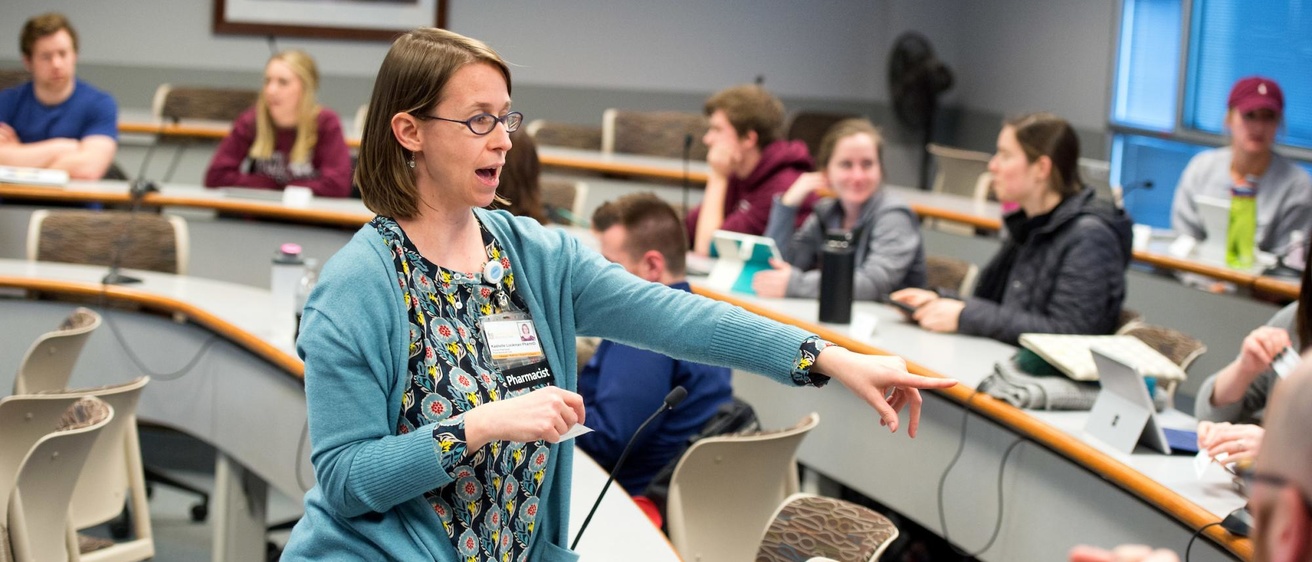The diagnosis was grim. The 68-year-old man had Stage 4 bladder cancer with tumors spreading to his spine, causing intense discomfort. Chemotherapy wasn’t an option. Doctors predicted he had a year to live. The man’s wife was distraught; she worried her husband was slipping into a deep depression.
“So that’s your patient. Now tell me how you’d approach his care,” says Kashelle Lockman, an assistant clinical professor in the UI College of Pharmacy, addressing her class. The students, who are role-playing doctors, nurses, pharmacists, chaplains, and social workers, toss out answers. “We don’t want to overwhelm him.” “Would music therapy help?” “What about pain management? Let’s make sure he’s comfortable.”
Lockman’s class, Foundations of Palliative Care, is part of an effort at the College of Pharmacy to meet the rising demand for end-of-life medical experts. The college recently added the Palliative Care Certificate—the school’s first professional certificate and one of only a handful of similar programs in the nation—with the goal of becoming a leader in palliative and hospice care education.
The first group of certificate students, many of whom will come from Lockman’s class, will begin their training this spring. The program is open to pharmacy students in their second year and will top out at 16 participants per graduating class. The program is expected to expand with the addition of a third clinical professor—Lockman is one of two professors now on staff—in the near future.
“The idea is to provide an enriched program to teach pharmacy students about palliative care,” says James Ray, clinical associate professor of pharmacy practice and science, who co-teaches with Lockman. “We hope to meet the rising demand for palliative care pharmacists, but also to ensure that every pharmacy graduate leaves with at least basic knowledge of palliative care.”
Students are showing interest. “My goal is to specialize in palliative care,” says Mackenzie Welsh, a third-year student from Cedar Rapids. Although she will not be able to get the certificate because she is too far along in her education, Welsh will participate in palliative rotations in a hospital setting. “It’s the area (in which) I feel I can make the most difference,” she says.
Palliative care is an interdisciplinary specialty that focuses on providing comprehensive care for patients with serious illnesses. It also extends care to a patient’s family members, who often struggle with difficult questions and emotions. Pharmacists trained in palliative care work with an interdisciplinary team to ease a patient’s pain and manage symptoms. Palliative care includes the use of medicine as well as alternative therapies, such as music therapy and spiritual guidance.
“We want to help our students develop empathetic skills,” says Lockman. “Some of them may have already experienced the loss of a loved one, but many have not. It’s important to understand when medicine can help, but also when it can’t. If there’s spiritual suffering, there’s no pill in the world that can fill that void.”
Lockman joined the palliative care team in July. Ray was hired in 2015 after a $1.5 million gift by UI alumnus James Otterbeck, chairman of OnePoint Patient Care, an independent hospice-pharmacy services provider. In 2014, when Otterbeck announced his gift, he told college officials that he was having difficulty finding well-trained palliative pharmacists to work in his business.
The new certificate program will teach students how to apply palliative care in emergency medicine, geriatrics, pediatrics, cardiology, and other medical environments. Graduates of the program will be eligible to participate in palliative care residencies and fellowships. Lockman predicts that at least two-thirds of the students in the introduction course will apply for the certificate program.
“I’m going to apply because I think the professors are great and because I think everyone who cares for a patient should know about palliative care,” says Samuel Williams, a second-year student from Marion.
